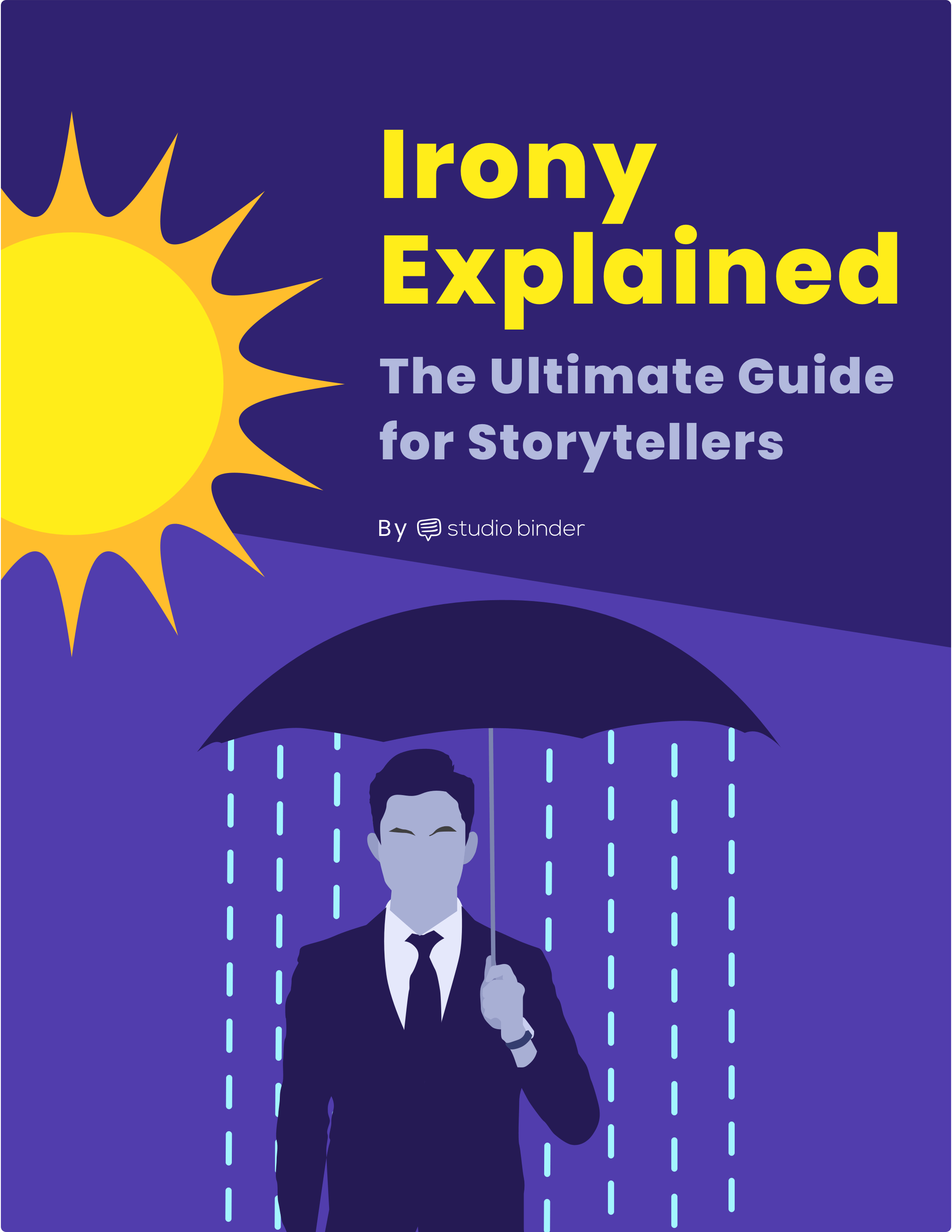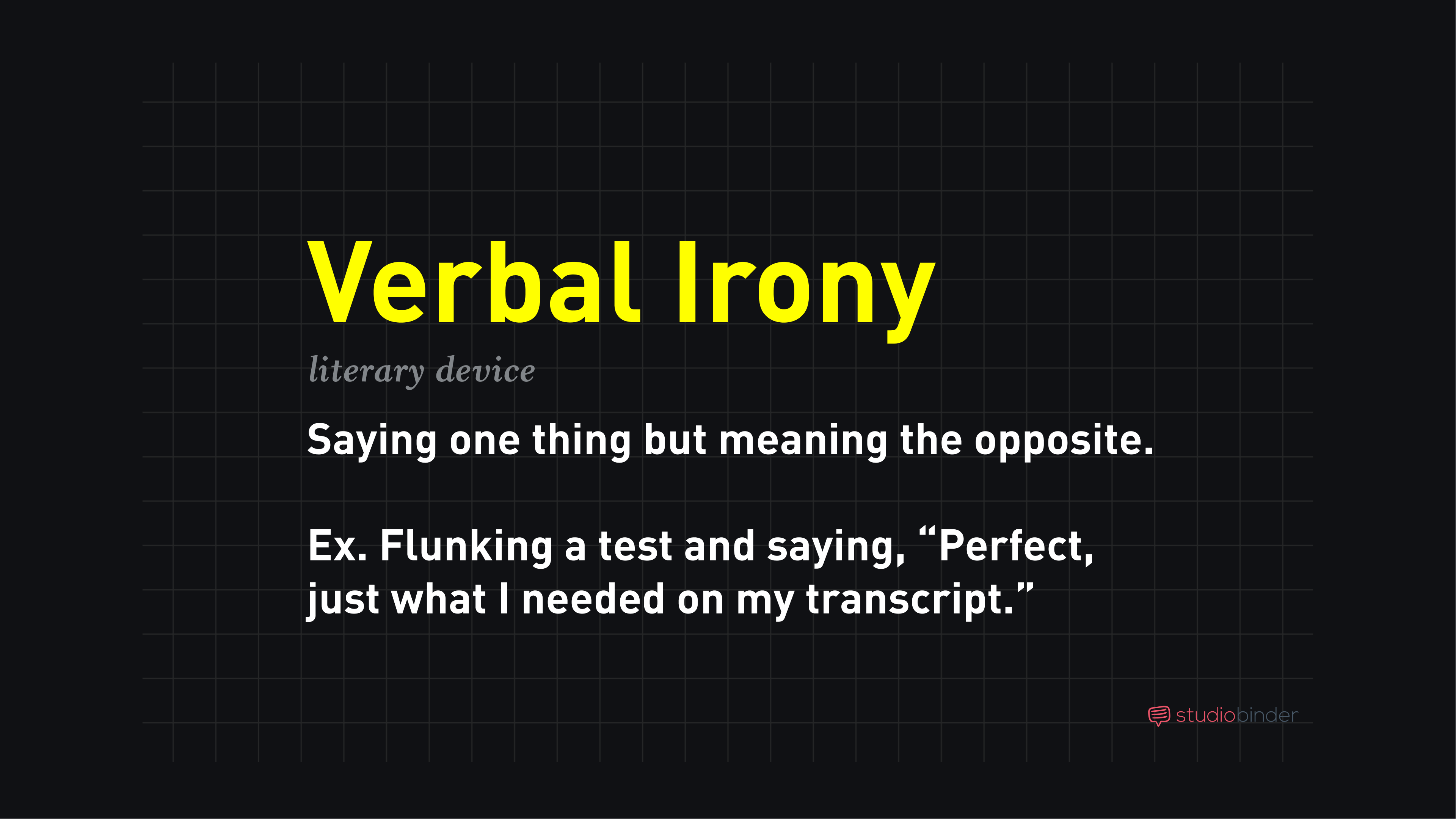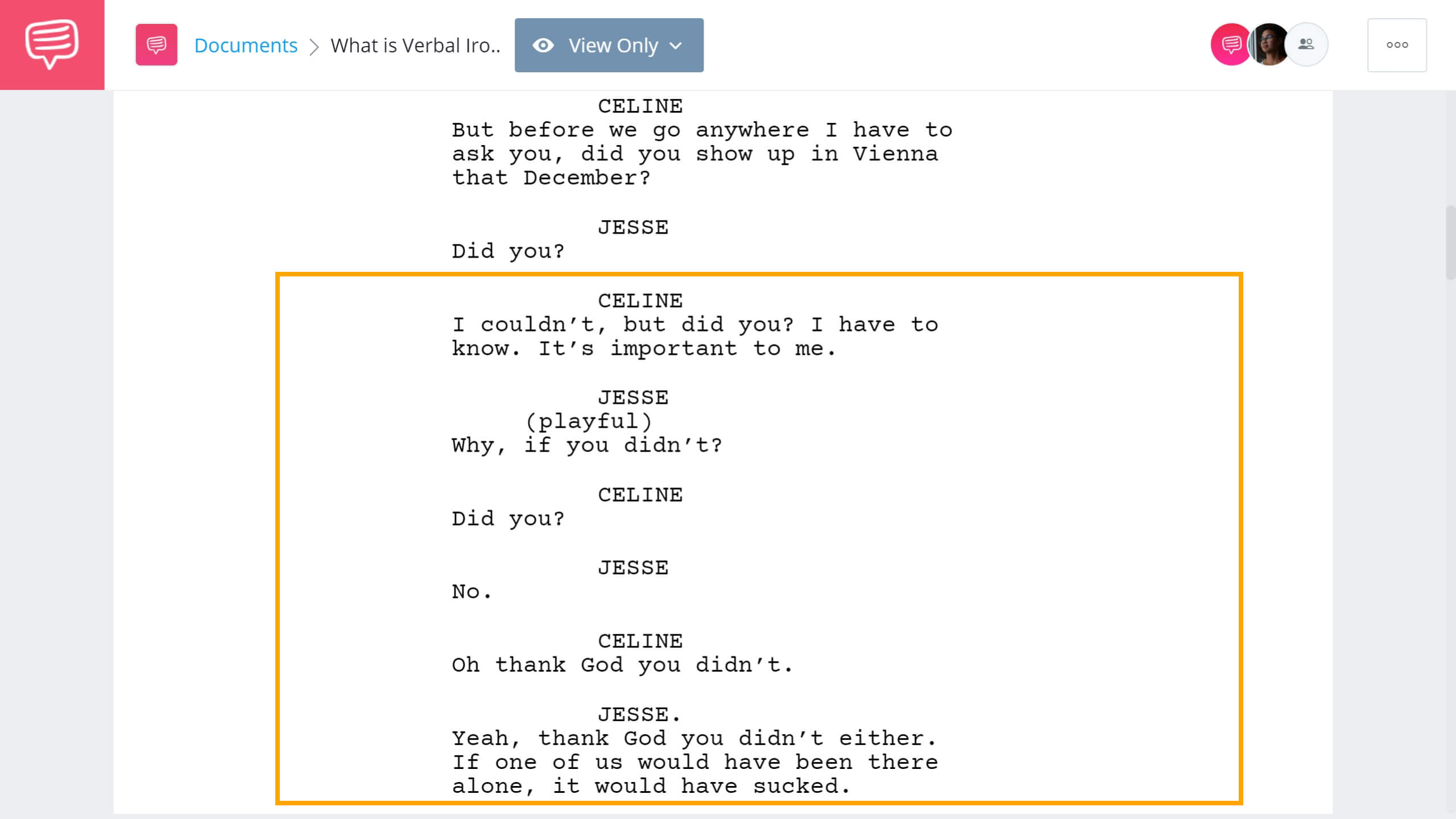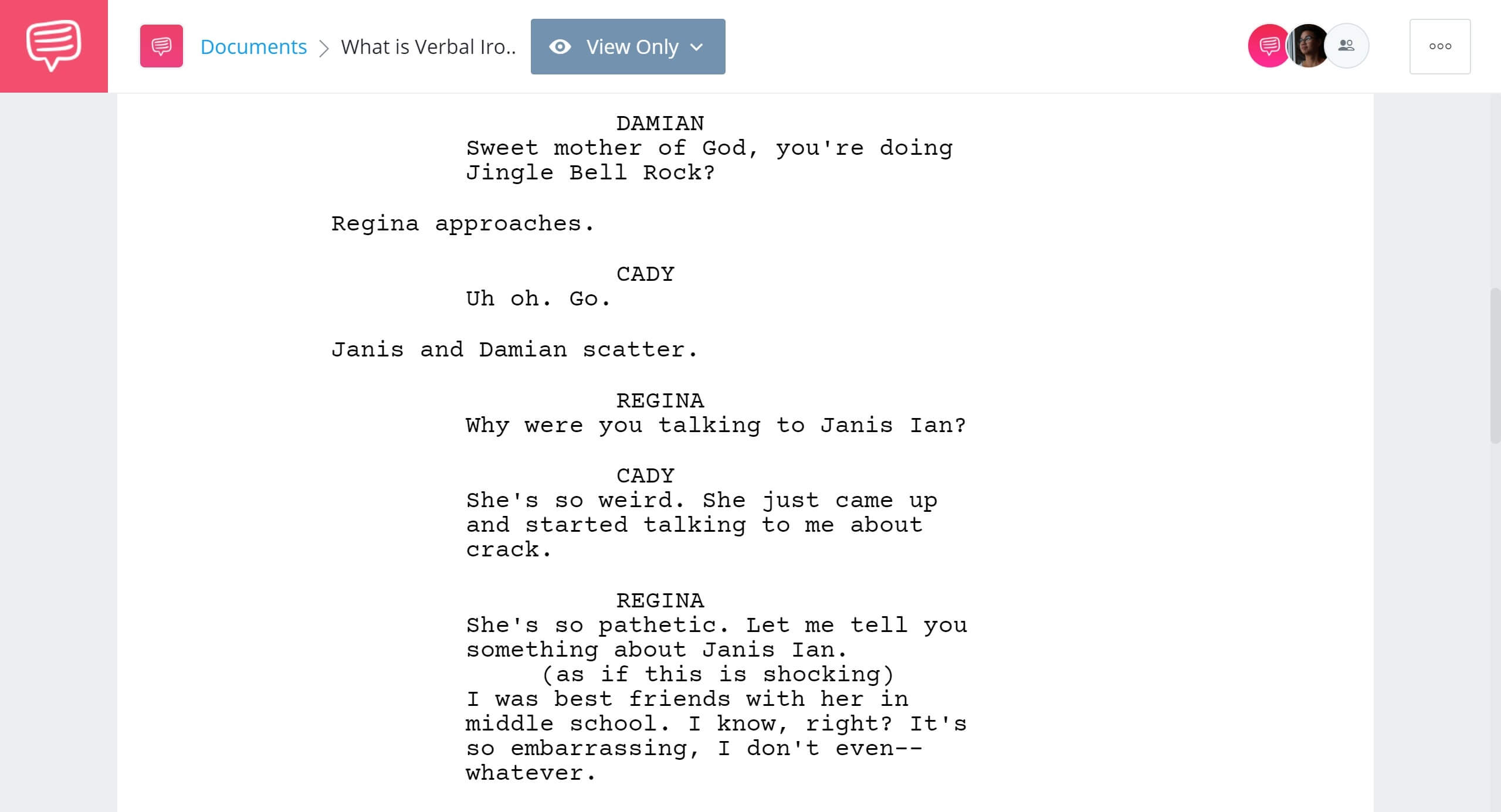Verbal irony is the most common type of irony because it’s tied directly to language – which we use every day. But what is verbal irony exactly and what are its different subtypes? We’re going to answer those questions by exploring how verbal irony can add depth and complexity to dialogue and, by extension, characters. In this article, we’re going to define verbal irony; including the different ways it can be used in screenwriting.
Verbal Irony Defined
Introducing verbal irony
The first thing we need to do is to define verbal irony. We use it all the time – and while the definition is actually quite simple, there are some nuances that we’ll need to discuss.
Verbal Irony Definition
What is verbal irony?
Verbal irony is when you say something different than what you mean. This is done intentionally by the speaker, often with the hope that either the listener or the audience recognizes the presence of irony.
Note: Verbal irony is not lying. A lie is a falsehood meant to deceive. This type of irony is much less nefarious.
What are the subtypes of verbal irony?
- Sarcasm
- Stable and unstable
- Understatement and overstatement
- Socratic irony
Verbal Irony Definition and Examples
Conceptual Verbal Irony Examples
Types of verbal irony
Verbal irony comes in many shapes and sizes. It can be used for comedy, romance, heartbreaking drama, satire, and much more. Let’s look at a few of its most common forms.
Socratic irony
Socratic irony is when the speaker feigns ignorance. This is often used in order to reveal the truth, baiting someone else to reveal what is actually going on.
A few Socratic irony examples:
In Pride and Prejudice, Elizabeth employs Socratic irony in many of her conversations with Mr. Collins. When he proposes, she pretends to consider the offer, which causes him to expose his own oversized sense of self-importance.
Elle uses Socratic irony in the final scene of Legally Blonde. She pretends to not know the significance of Chutney getting a perm, getting Chutney to ruin her own alibi.
Understatement
You’ve probably heard understatement used in everyday conversations. Understatement dramatically minimizes the significance of a situation. Say you hear that the company you work at has just filed for bankruptcy, and a colleague says, “That might be an issue.” That’s an understatement, and an example of verbal irony.
Some more examples:
Holden Caulfield in The Catcher in the Rye: “I have to have this operation. It isn’t very serious. I have this tiny little tumor on the brain.”
“It’s just a flesh wound”: the famous quote from the knight whose limbs have been chopped off in Monty Python and the Holy Grail.
Overstatement
Alternatively, verbal irony can wildly overstate a situation. This would be when the company you work at announces they’re buying new office chairs, and your colleague says, “This is the greatest thing that has ever happened.”
A few more overstatements:
- Huck’s description of trees in Huckleberry Finn: “It might have been that these trees went down to the center of the earth and plumb through to China for all I knew.”
- Rolley describes how hungry he is in Dalmatians: “I’m so hungry I could eat a whole elephant.”
Stable irony
Verbal irony generally can be split into two types: stable and unstable. Stable irony is where readers are able to infer the author’s voice. In other words, they can intuit how the speaker feels about a certain subject. Here are a few examples:
Juliet in Romeo and Juliet: “O happy dagger! This is thy sheath; there rust, and let me die.” We know that Juliet does not find anything happy in this situation.
The title of Dr. Strangelove or: How I Learned to Stop Worrying and Love the Bomb. It is clear that Kubrick is not advocating to love the bomb.
Unstable irony
With unstable irony, on the other hand, it is not obvious how an author or speaker feels about a subject. The irony, therefore, is typically more subtle and ambiguous. A couple of examples:
Nick Carraway in The Great Gatsby: “I am one of the few honest people that I have ever known.” We aren’t sure if this is true or tongue-in-cheek, creating an unstable irony.
Jesse in Before Sunset: He uses unstable irony to joke about whether or not he showed up as planned.
Verbal irony is also used romantically throughout Richard Linklater’s Before trilogy. We imported the Before Sunset screenplay into StudioBinder’s screenwriting software to take a closer look at a specific example. In this scene, Celine asks Jesse if he showed up to their planned meeting. At this point, we don’t know if he did.
Verbal Irony Examples • Verbal Irony in Before Sunset
Jesse’s line “If one of us would have been there alone, it would have sucked” is an example of unstable verbal irony. Jesse continues to ramp up the verbal irony, then eventually confirms he did show up.
This use of unstable irony adds a playful romantic feeling to the exchange, but also underscores Jesse’s slight insecurity about having shown up.
Now, let’s look at a rhetorical device that irony is often conflated with.
Verbal Irony Synonyms and Antonyms
Verbal irony vs. sarcasm
When we hear verbal irony, our automatic assumption is that it's sarcasm – but there is one tiny difference between the two.
Sarcasm is verbal irony with attitude — the intention being to hurt or mock someone. The amount of cruelty can range from light-hearted joking to downright nasty.
Mean Girls is all about deception and duplicity. Regina George, as Queen of the Plastics, is no stranger to these concepts and this is the first time Cady figures that out. Let’s take a look at the Mean Girls script to see how this scene comes together.Verbal Irony in Mean Girls
Here, we see Cady feign ignorance by pretending to care about Regina’s diatribe. We know Janis didn’t “just come up and start talking about crack.” In fact, we know that Janis is in on the con with Cady. Let’s check out the scene from the movie to see it in motion.
Remember: all sarcasm is verbal irony, but not all verbal irony is sarcasm. There is constant confusion over irony vs. sarcasm but hopefully you understand the difference now.
Now that we've covered what is verbal irony and how to use it, check out our FREE ebook covering the types of irony, examples, and how writers wield it.
Free downloadable bonus
FREE Download
Ultimate Guide to Irony
Irony is an essential literary device that all writers should master. Download our FREE e-book to get in-depth explanations and examples on topics like the major types and sub-types of irony, and the myriad of ways writers can use it to enrich their storytelling.

UP NEXT
Dive deeper into irony
We've covered the basics of verbal irony but there is so much more to learn. If there is a particular form of irony you want to explore further, just follow the navigation below. Each one of these subtypes of irony belongs in every writer's toolkit.
Types of Irony
Read a summary of the various types of irony, or dive into the specifics below.



